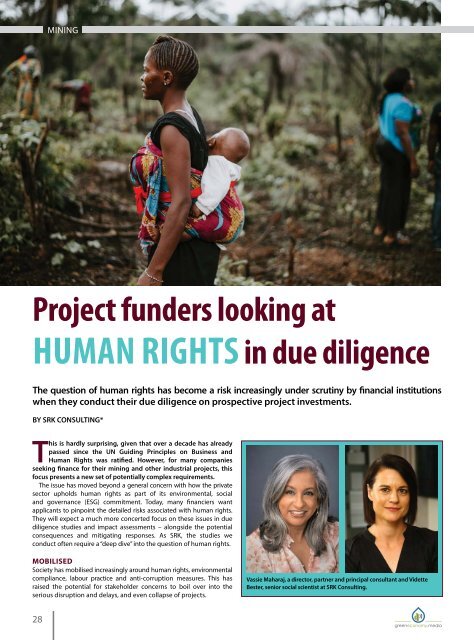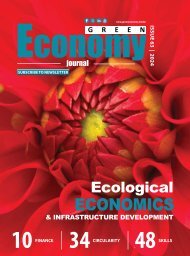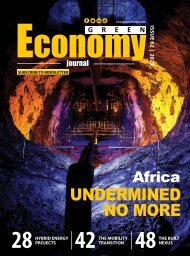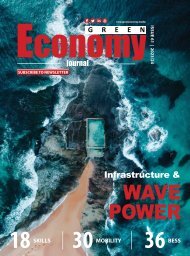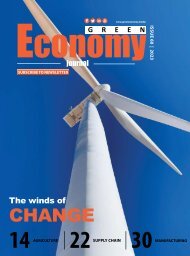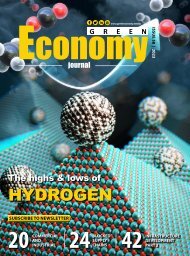Create successful ePaper yourself
Turn your PDF publications into a flip-book with our unique Google optimized e-Paper software.
MINING<br />
MINING<br />
Project funders looking at<br />
HUMAN RIGHTS in due diligence<br />
In this context, lenders are much more aware of human rights-related<br />
risks that project developers must carefully analyse and mitigate.<br />
A key aspect of identifying and addressing these risks is stakeholder<br />
engagement. This is seen, for instance, in the Global Industry Standards<br />
on Tailings Management (GISTM), which was fast-tracked in response<br />
to the catastrophic tailings dam failure in Brumadinho, Brazil in 2019.<br />
ENGAGEMENT<br />
The GISTM prioritises that mining companies respect the rights of<br />
project-affected people by meaningfully engaging them at all phases<br />
of the tailing facility life cycle. Engagement with communities and other<br />
stakeholders is now a vital element of the human rights agenda.<br />
Preparation for mine closure is another area that demands<br />
extensive engagement with stakeholders. The mining sector has built<br />
considerable capacity in the environmental field, to deal with closure.<br />
This is not matched on the social front – with many projects struggling<br />
with more abstract social impacts and focusing on purely technical<br />
considerations.Communities are often dependent on mining activities<br />
for employment, services and a market for local businesses. With mines<br />
historically falling into the trap of industrial paternalism, they tend to<br />
provide mine employees with services such as housing and health care<br />
but are still wrestling with how best to create sustainable communities<br />
beyond the life-of-mine.<br />
VULNERABILITY<br />
Aspects like gender equality are gaining importance in the<br />
sustainability space. These concerns relate, for instance, to the reality<br />
of women often having less secure land rights. This makes them<br />
particularly vulnerable to land grabs, eviction and dispossession<br />
that are still associated with some large-scale developments in the<br />
extractives and agricultural sectors.<br />
Any injustices in the treatment of project-affected people can raise<br />
warning flags about the project’s lack of sustainability – or at least<br />
certain strategic weaknesses. These are, of course, of great concern to<br />
everyone who wants the project to succeed, including funders – for<br />
whom there are considerable financial interests at stake.<br />
This focus on human rights<br />
extends beyond the operational realm.<br />
context. Not only should this include a policy commitment to meet<br />
their responsibility to respect human rights; it should also contain a<br />
due diligence process to identify, prevent, mitigate and account for<br />
how they address their impacts on human rights. Further, there should<br />
be processes in place to remediate adverse human rights impacts.<br />
This focus on human rights extends beyond the operational realm<br />
into the project’s entire upstream and downstream supply chain – and<br />
into aspects such as responsible sourcing. In Europe, the RE-SOURCING<br />
initiative is already paving the way for a common understanding about<br />
responsible sourcing between mineral producers and their Europebased<br />
customers.<br />
SRK is integrally involved in this project, which arises from decades<br />
of global concern about issues like child labour, slavery and unethical<br />
behaviour in the mineral supply chain. The RE-SOURCING project works<br />
to promote both strategic agenda setting and a coherent application of<br />
practices for responsible sourcing.<br />
Minerals like cobalt, for instance, are increasingly important to the<br />
future of battery and renewable technology. At the same time, there<br />
are concerns about human rights in the artisanal mining sectors of<br />
countries like the Democratic Republic of Congo – where much of the<br />
world’s cobalt is mined.<br />
With the eyes of the public and authorities focused intensely on<br />
mining for many reasons, the industry will need to develop systematic<br />
and credible strategies to address human rights risks. The most effective<br />
approaches will begin early in the project life cycle and be carried<br />
forward to post-closure phases.<br />
The question of human rights has become a risk increasingly under scrutiny by financial institutions<br />
when they conduct their due diligence on prospective project investments.<br />
BY SRK CONSULTING*<br />
Any injustices in the treatment<br />
of project-affected people can raise<br />
warning flags about the project’s<br />
lack of sustainability.<br />
This is hardly surprising, given that over a decade has already<br />
passed since the UN Guiding Principles on Business and<br />
Human Rights was ratified. However, for many companies<br />
seeking finance for their mining and other industrial projects, this<br />
focus presents a new set of potentially complex requirements.<br />
The issue has moved beyond a general concern with how the private<br />
sector upholds human rights as part of its environmental, social<br />
and governance (ESG) commitment. Today, many financiers want<br />
applicants to pinpoint the detailed risks associated with human rights.<br />
They will expect a much more concerted focus on these issues in due<br />
diligence studies and impact assessments – alongside the potential<br />
consequences and mitigating responses. As SRK, the studies we<br />
conduct often require a “deep dive” into the question of human rights.<br />
BASIC NEEDS<br />
A human rights focus is not new to environmental and social impact<br />
assessments (ESIAs), and people’s rights have in many ways always<br />
been embedded in our work as ESIA practitioners. Our investigations<br />
of environmental impacts such as water quality, air emissions or noise<br />
pollution consider how these will impact people’s health and basic<br />
needs – essentially their rights.<br />
More recently, financial institutions will often require SRK to include<br />
an in-depth assessment of human rights impacts within a due diligence<br />
or other study or review. A growing concern is the reputational risk<br />
related to borrowers’ non-compliance with key industry benchmarks<br />
like the UN’s Guiding Principles and the International Finance<br />
Corporation (IFC) performance standards.<br />
MOBILISED<br />
Society has mobilised increasingly around human rights, environmental<br />
compliance, labour practice and anti-corruption measures. This has<br />
raised the potential for stakeholder concerns to boil over into the<br />
serious disruption and delays, and even collapse of projects.<br />
Vassie Maharaj, a director, partner and principal consultant and Vidette<br />
Bester, senior social scientist at SRK Consulting.<br />
SUITABLE POLICIES<br />
The UN’s Guiding Principles demand that business enterprises should<br />
have the right policies and processes in place, to suit their size and<br />
* Article written by Vassie Maharaj and Dr Vidette Bester, SRK Consulting.<br />
28<br />
29


